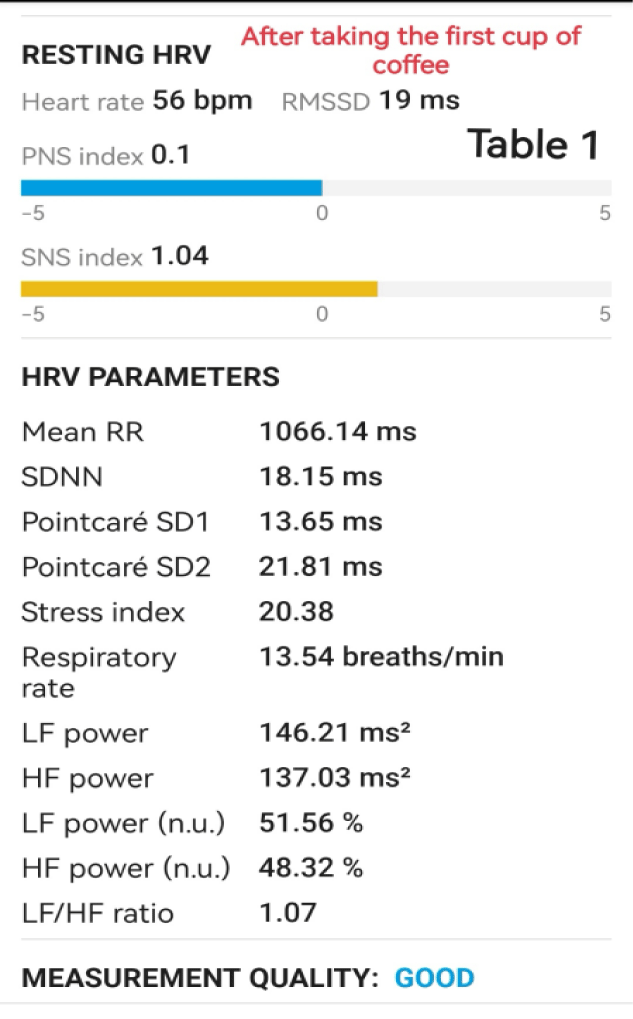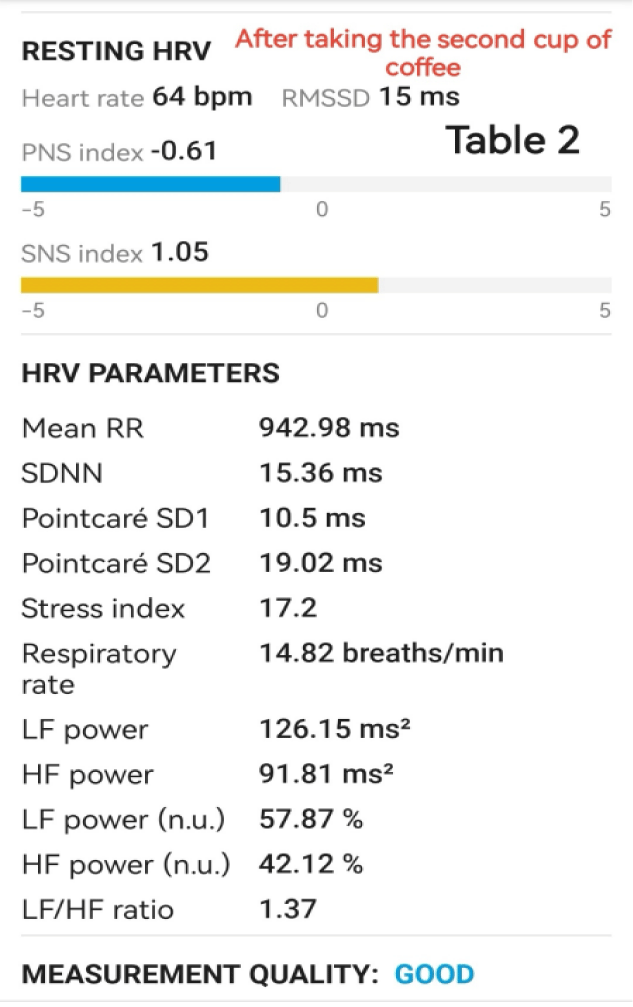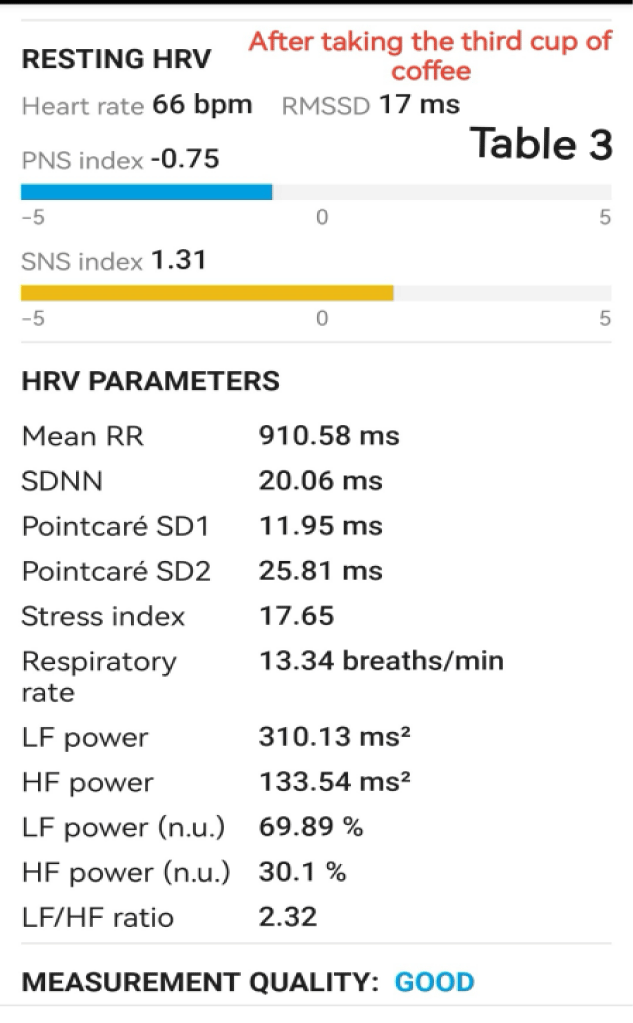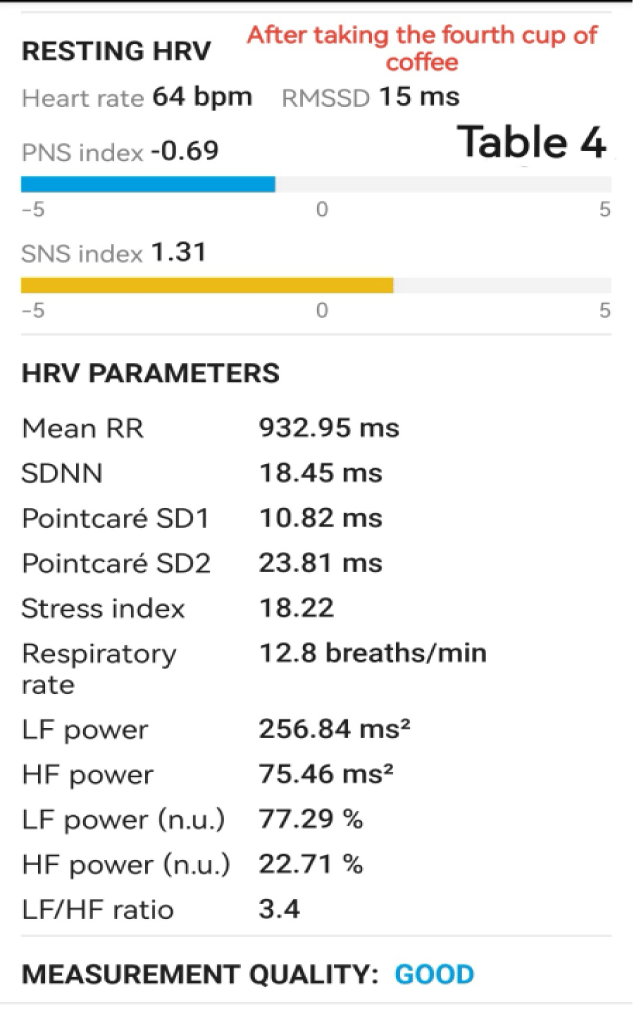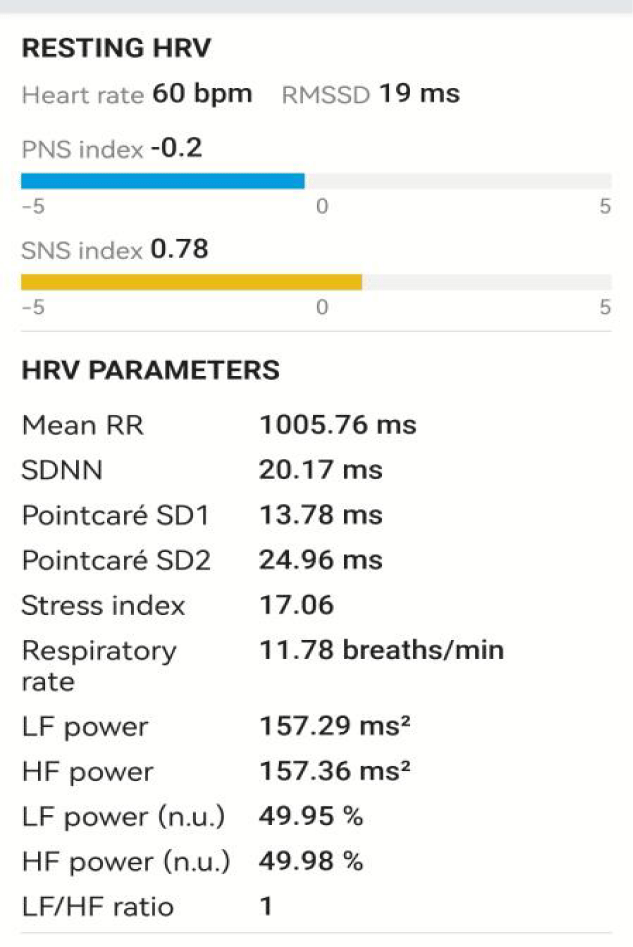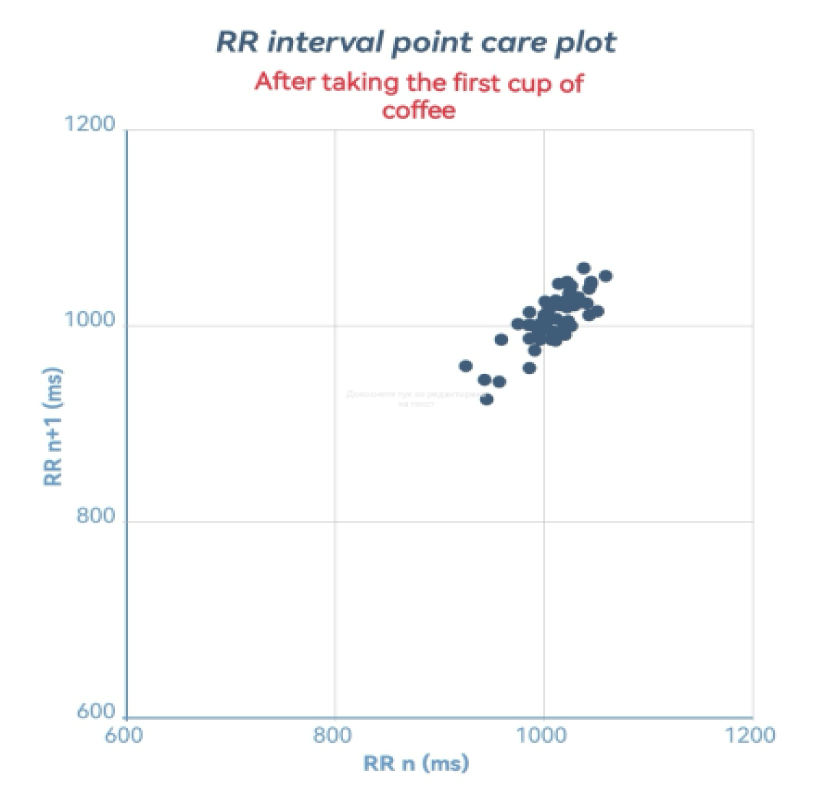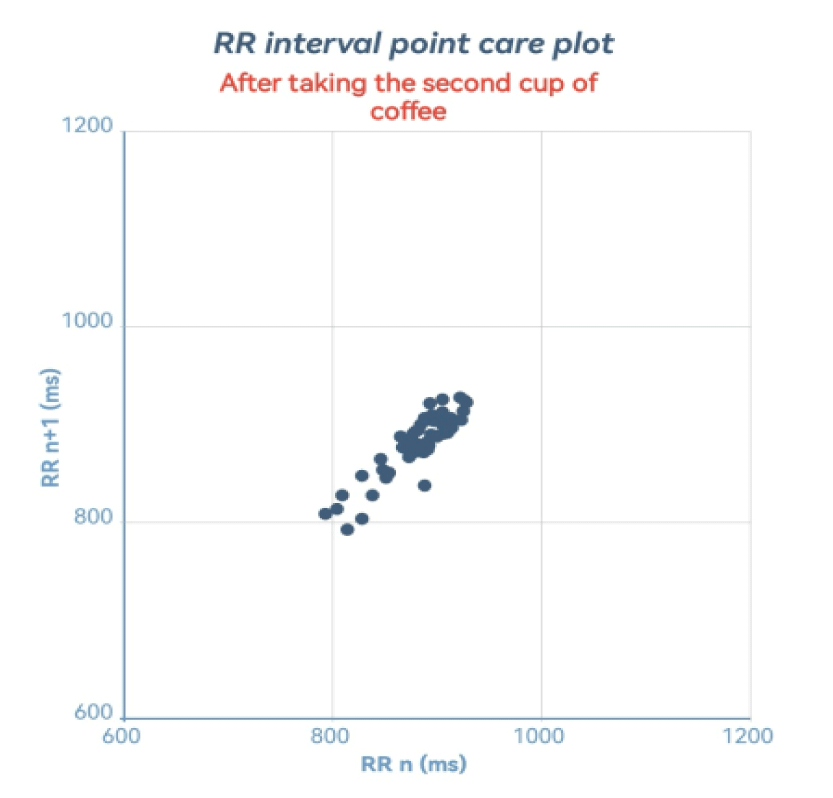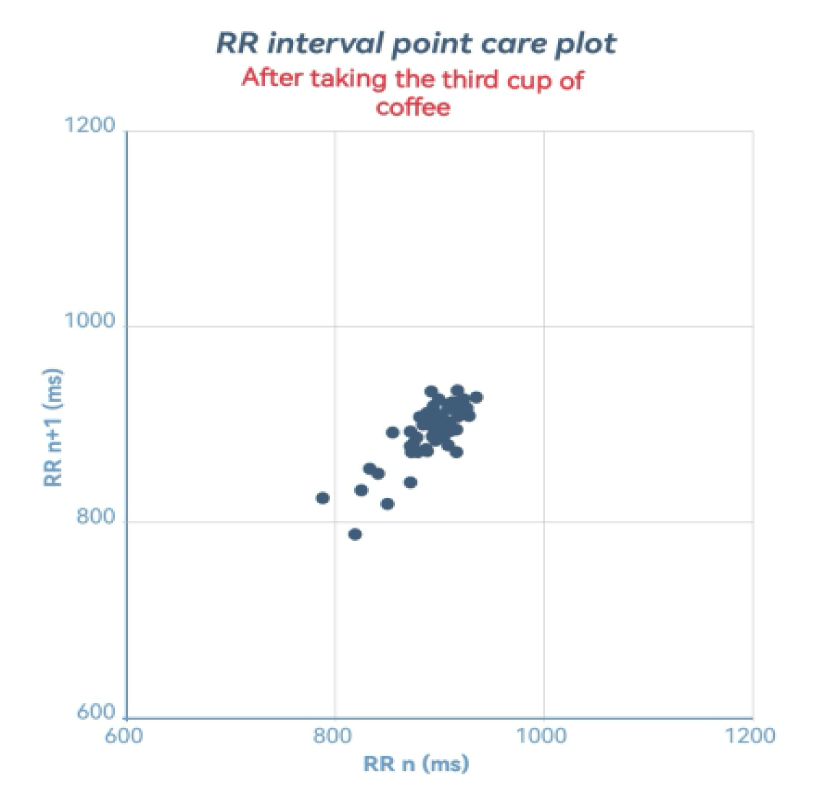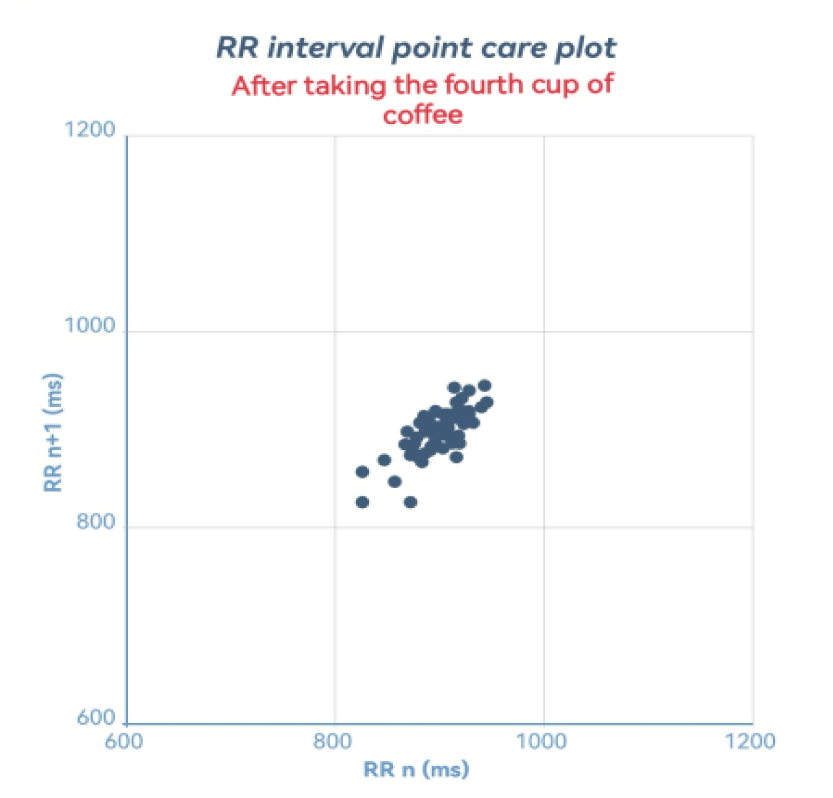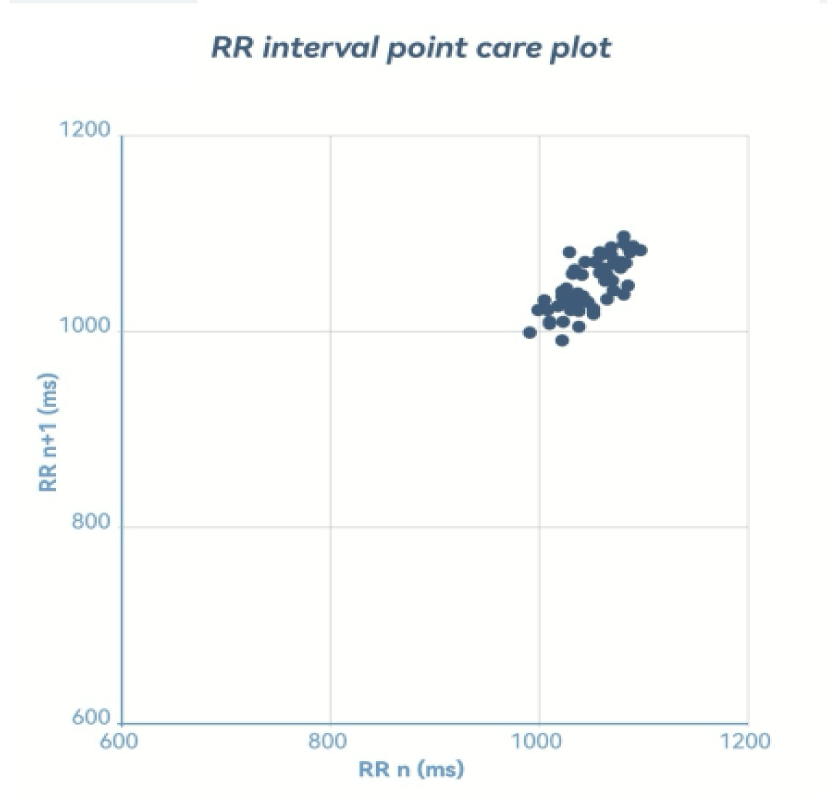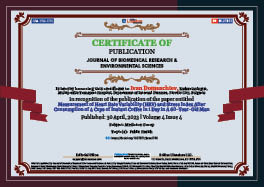Medicine Group . 2023 April 30;4(4):833-836. doi: 10.37871/jbres1740.
Measurement of Heart Rate Variability (HRV) and Stress Index After Consumption of 4 Cups of Instant Coffee in 1 Day in A 60-Year-Old Man
Ivan Domuschiev*
Introduction
The Measurement of Heart Rate Variability is the most accurate method for quantitative assessment of both divisions of the autonomic nervous system (sympathetic and parasympathetic) as well as sympatho-vagal balance.
The Coffee is one of the most commonly consumed beverages in the world. That is why it is appropriate to follow in dynamics during the day how coffee affects the autonomic nervous system (HRV and stress).
Material
The measurement of HRV-parameters and the stress index was carried out in a 69-year-old man. He has height 178 cm, weight 75 kg and BMI = 24.
Method
This study was done in the morning immediately after awakening from sleep at 8 o'clock under basal conditions (in complete rest in the supine position, complete silence and optimal room temperature). A short-term measurement of HRV parameters was made during 3 minutes. A "Polar H10" chest strap (with Bluetooth BLE signal transmission) was used, and the obtained data were processed and analyzed by the "Kubios HRV" software.
Immediately after breakfast, the subject consumes the first cup of instant coffee at 8.30 am. The next 3 cups of instant coffee (4 in total) were consumed by this person at 1-hour intervals. 30 minutes after the consumption of coffee from each cup (4 in total) HRV parameters and the stress index were measured at complete rest.
Results
The obtained results are presented in 1-5 tables and 1-5 figures (from each measurement of HRV - parameters).
Conclusion
From the results obtained in this study, it can be seen that the stress index increases slightly (from 17.06 to 18.22) and the LF/HF ratio also increases (from 1 to 3.4). Therefore, in our case, the intake of 4 cups of instant coffee by the studied elderly man leads to an increase in sympathetic tone, which causes a slight increase in the stress index. However, the changes of HRV-parameters are not strongly expressed. The investigated man is a non-habitual coffee consumer.
Zimmermann-Viehoff and co-authors [1] found in his study any differences in short-term effects of espresso coffee on heart rate variability in habitual and non-habitual coffee consumers.
However, in other made study [11] results suggest that regular caffeine use does not necessarily lead to tolerance for caffeine-stress interactions and that certain characteristics may be associated with greater sensitivity to caffeine's effects [1-11].
References
- Zimmermann-Viehoff F, Thayer J, Koenig J, Herrmann C, Weber CS, Deter HC. Short-term effects of espresso coffee on heart rate variability and blood pressure in habitual and non-habitual coffee consumers--a randomized crossover study. Nutr Neurosci. 2016 May;19(4):169-75. doi: 10.1179/1476830515Y.0000000018. Epub 2015 Apr 7. PMID: 25850440.
- de Oliveira RAM, Araújo LF, de Figueiredo RC, Goulart AC, Schmidt MI, Barreto SM, Ribeiro ALP. Coffee Consumption and Heart Rate Variability: The Brazilian Longitudinal Study of Adult Health (ELSA-Brasil) Cohort Study. Nutrients. 2017 Jul 13;9(7):741. doi: 10.3390/nu9070741. PMID: 28703735; PMCID: PMC5537855.
- Koenig Julian, Jarczok Marc, Kuhn Wolfgang, Morsch Katharina, Schäfer Alexander, Hillecke Thomas, Thayer Julian. Impact of Caffeine on Heart Rate Variability: A Systematic Review. Journal of Caffeine Research. 2013. doi: 10.1089/jcr.2013.0009.
- Sondermeijer HP, van Marle AG, Kamen P, Krum H. Acute effects of caffeine on heart rate variability. Am J Cardiol. 2002 Oct 15;90(8):906-7. doi: 10.1016/s0002-9149(02)02725-x. PMID: 12372588.
- Porto AA, Benjamim CJR, Gonzaga LA, Luciano de Almeida M, Bueno Júnior CR, Garner DM, Valenti VE. Caffeine intake and its influences on heart rate variability recovery in healthy active adults after exercise: A systematic review and meta-analysis. Nutr Metab Cardiovasc Dis. 2022 May;32(5):1071-1082. doi: 10.1016/j.numecd.2022.01.015. Epub 2022 Jan 22. PMID: 35272883.
- Dinesh V Syce, Susheela Veliath, Krishnamurthy N. The Effect of Coffee On Heart Rate Variability. Int J of Adv Res. 2014.
- Sargent CT, Shahbal TK, Carrillo AE, Amorim T, Edsall JR, Ryan EJ, Ryan EJ. Effects of Low Dose Caffeine on Post-Exercise Heart Rate Variability: A Double-Blind Placebo-Controlled Trial. Int J Exerc Sci. 2021 Dec 1;15(2):103-112. PMID: 36895796; PMCID: PMC9987438.
- Benjamim CJR, Monteiro LRL, Pontes YMM, Silva AAMD, Souza TKM, Valenti VE, Garner DM, Cavalcante TCF. Caffeine slows heart rate autonomic recovery following strength exercise in healthy subjects. Rev Port Cardiol (Engl Ed). 2021 Jun;40(6):399-406. doi: 10.1016/j.repce.2020.07.021. PMID: 34274079.
- Claiborne A, Alessio H, Slattery E, Hughes M, Barth E, Cox R. Heart Rate Variability Reflects Similar Cardiac Autonomic Function in Explosive and Aerobically Trained Athletes. Int J Environ Res Public Health. 2021 Oct 12;18(20):10669. doi: 10.3390/ijerph182010669. PMID: 34682412; PMCID: PMC8535639.
- Jason Vansickle, Robin Putnam, Matthew Harris, Matthew Garcia, Brett Bell, Michael Nelson, Lonnie Lowery. Caffeine Intake Does Not Negatively Affect Heart Rate Variability in Physically Active University Students: Preliminary Findings. Current Developments in Nutrition. 2020;4.
- Lane JD, Williams RB Jr. Cardiovascular effects of caffeine and stress in regular coffee drinkers. Psychophysiology. 1987 Mar;24(2):157-64. doi: 10.1111/j.1469-8986.1987.tb00271.x. PMID: 3602267.
Content Alerts
SignUp to our
Content alerts.
 This work is licensed under a Creative Commons Attribution 4.0 International License.
This work is licensed under a Creative Commons Attribution 4.0 International License.





